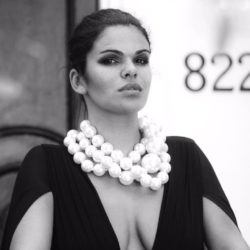DJs and rock stars find peace of mind at historic Hotel Shangri-La, thanks to its dynamic hostess hotelier, Tamie Adaya.
PHOTOGRAPHER ANDREAS NEUMANN ART DIRECTOR ELLA MCNANEY HAIR STYLIST MELISSA HERNANDEZ MAKE-UP ARTIST BRIANA DUNNING WARDROBE TALENT’S OWN PRODUCTION VENI MAGAZINE PRODUCTION ASSISTANT CATHERINE FORSYTH INTERVIEW CHRISTIAN CHENSVOLD


Back in the younger days of sex, drugs, and rock ‘n’ roll, there was the saying, “Don’t trust anyone over thirty.” Alas the people who repeated that mantra were unable to stop the march of time, and eventually found themselves deep into the wiser half of life. One such sage is Tamie Adaya (first name pronounced tay-me), who has a special gift for connecting youthful talent with experience and resources. The Pakistani-born cosmopolite operates the Art Deco icon Hotel Shangri-La in Santa Monica, and thanks to her other forays in the electronic music scene, she has amassed a cult following of DJs and others at the forefront of pop culture who find rest and respite among her stylish accommodations.
Here, the mother, businesswoman and salon hostess talks about life, balance, and how to have it all.
VM: You recently gave a lecture on social changes reflected in the hotel industry. Tell us what’s going on.
TA: Luxury hotels are increasingly becoming communal living rooms. A lot of younger people live in apartments and shared living spaces, and they congregate in cafes and bars to meet people. But these places have a lot of noise pollution such as loud music, and you can’t do proper business there. So, I’m seeing a trend where people who are creative are doing their work and having meetings at luxury hotel lobbies and dining rooms as a sanctuary in the urban jungle. Hotels are elegant, grounding, have more space, and there are more serious people there.
VM: It’s certainly odd how many cafes are filled with people trying to work, read, or converse, yet the establishments insist on playing loud music.
TA: Anything worth achieving requires concentration. And you can’t do that with loud music, headphones, or people around you shouting. You’re not going to get anything worthwhile done.
VM: That leads to the notion of our self-imposed prison of a 24/7 work cycle and mobile phone addiction. How do you put up parameters and stay sane?
TA: First off, I only check my email twice a day: at the beginning of the workday and the end. More than that just gets counter-productive. I don’t really answer the phone unless I know who it is, and I turn my phone off at night and listen to meditation before I go to sleep. I think self-care is really important in this day and age, and to have a spiritual practice, a proper diet, and exercise. When you don’t have these things, then your life goes out of balance. And if you don’t enjoy what you do, you’re not going to be good at it.
VM: What do you enjoy the most about your work?
TA: I’m a people person. I love putting people together and seeing the magic that transpires. I have impromptu salons where I’ll put interesting people together. I encouraged one collaboration and a Grammy came out of it!
VM: You’re especially interested in young people, and are often backstage with top DJs, who always stay with you when visiting LA. Talk about the notion of mentoring the young; is there less generational continuity today?
TA: I find it the opposite. You’d be surprised how often I get approached by young women asking me how I seem to have it all. And I always tell them you can have it all, just not all at the same time. There will be stages in your life when you will be an amazing wife and mother, but you may not be at the top of your career. And then you’ll be at the top of your career, but maybe your love life will fall apart.
VM: What do you think the phrase “having it all” means today?
TA: In 2018 it means having a balanced life and being at peace with yourself. And not just the destination, but enjoying the journey. And a full night’s sleep is the new rock ‘n’ roll. Everyone wants to brag about how busy they are rushing around and drinking lattes. It’s not sexy to be that way. What’s sexy is the opposite of what everyone is doing. The counterculture is being balanced and having a full night’s sleep, so your brain is good, you can help people, and you’re not suicidal!
VM: What’s a recent life lesson you’ve learned? Something you didn’t understand as fully as you do now?
TA: Lately I’ve been thinking about the luxury of immersion. When you’re younger, you can immerse yourself in things like studying, writing, and music. But as we get older demands become much stronger, and immersion becomes a luxury, even though it’s what you truly need. That’s why when learning a foreign language, you need to go to that country and immerse yourself, because that’s how you can excel. So, whatever it is you want to do, such as go to a yoga retreat, you can be shut off from the outside world.
VM: What’s life in LA like for you?
TA: It’s a beautiful city, but also disconnected. Geographically it’s so vast that it’s hard for like-minded people to find a community or subculture. People are less social and face-to-face than in other cities. And once you have children you kind of drop out, unlike in London or New York.
VM: What’s it like when you visit Pakistan as a successful, Westernized woman?
TA: People have the weird impression that it’s a crazy country, but the Karachi that I grew up in was very cosmopolitan. I grew up wearing miniskirts and go-go boots and listening to The Kinks, The Rolling Stones, and The Beatles. I come from a family that was very cosmopolitan, and grew up speaking English. The war with Afghanistan is when Pakistan went into the dark ages, but now there’s a cultural renaissance again, largely headed by women.
VM: Speaking of go-go boots, you’re known for your exceptional style. What in fashion is inspiring you lately?
TA: I get inspired by so many things, but I always come back to Art Deco, which is the first expression of Modernism, while taking in classical elements, such as Egyptian, Greek and Roman. It had a revival in the ’80s, and again 10 years ago, and might have another, and each iteration of Deco is so interesting. I’m also inspired by literature, by Madame de Pompadour’s salons, by Polynesia and Hawaii, colonial architecture and gardens, and Asia. And, of course, rock ‘n’ roll.


